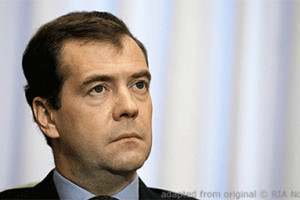RUSSIALINK TRANSCRIPT: “[Medvedev at] Moscow Financial Forum” – Government.ru

(Government.ru – September 8, 2017)
Dmitry Medvedev addressed a plenary session of the Moscow Financial Forum titled Financial System of the 21st Century Competitive Economy: Challenges and Solutions.
The Moscow Financial Forum is a platform for professional discussions aimed to build up effective solutions in the sphere of financial policy and enhance the competitiveness of the Russian economy.
MFF 2017 will focus on changing the structure of the global financial system to promote economic growth, deal with current challenges and ensure sustainable growth, as well as on international experience and national features of the digitalisation of the economy.
Excerpts from Dmitry Medvedev’s remarks:
Today all of us are faced with tasks whose successful resolution will determine global economic development for years and even decades. Financial markets are a vital component of economic development. The current political environment is not favourable for finding joint solutions, but we must continue working under any conditions.
We highly appreciate the confidence of foreign investors, who continue working in Russia because we can move forward despite the restrictions. In some cases, these restrictions have even benefited our development, although restrictions are never a positive solution and can only lead into a dead-end.
Russia’s GDP growth accelerated to 2.5 percent in the second quarter compared to the same period of last year. Investment growth reached 6.3 percent. Foreign trade rates are surging back. Non-oil and gas trade went up by over 25 percent in the first six months of the year. These are visible signs of economic recovery.
Our goal is to boost our economic growth rate to the world’s average and surpass it. The necessary mechanisms for attaining this goal are available to us.
These mechanisms include the maintenance of favourable macroeconomic conditions, primarily a record low inflation and a moderate and gradually decreasing state budget deficit. The main principle of our budgetary policy is the improvement of structural spending and the attainment of our priorities as we see them.
We are reducing our dependence on the fluctuation of global oil prices. With this aim in view, we have formalised a new structure of the budgetary rule.
We are also creating conditions for business development, the most important of which is a predictable and transparent taxation policy. We also regulate non-tax payments and limit the growth of tariff rates. Overall, the financial burden on good faith taxpayers has not changed.
We will continue to reform the regulatory system based on the principle of preventing, rather than punishing for corruption crimes. We plan to submit a draft law to this effect at the current parliamentary session.
We have proposed a number of additional solutions in the sphere of investment. For example, we have expanded the SME lending programme. We have paid out over 10 billion roubles under this programme in July and August, primarily for investment purposes. We hope to attain the approved target of some 50 billion roubles of additional allocations by the end of the year.
The mechanism of the project financing factory must become operational in the longer term. The federal budget for 2018-2020 stipulates the annual allocation of some 50 subsidies worth in total some 70 billion roubles to support investment projects in real economy sectors. The SME lending programme and the project financing factory are structured so that the influence of officials on any loan decisions will be precluded.
We must launch the infrastructure loan programme by mid-2018. It is designed to increase private investment in infrastructure projects.
We have adopted the Digital Economy programme, which covers all spheres. Digitalisation not only amounts to a breakthrough achievement but will also present new challenges. The blockchain distributed ledger technology involves cryptocurrencies and the so-called smart contracts, which are expanding market opportunities. On the other hand, the lack of common rules on using these instruments is creating new market challenges. The world’s largest banks are discussing joint operation in this sphere. The Russian banking community is also working out its approaches to this.
Technological transformation based on digital economy can promote an exponential growth of labour efficiency, but it can also kill some professions and increase income inequality risks. It is critically important for us to prepare the key government institutions, such as healthcare, education, social assistance and employment support, for dealing with these challenges. This involves the modernisation of state machinery, so that all the standard and routine activities are digitalised.
[featured image is file photo from different occasion]
